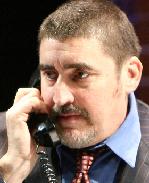
In the gripping poker games of Dealer's Choice and the frayed relationships of Closer, Patrick Marber keenly mapped the emotional toll of compulsive behavior and casual cruelty. At his frequent best, he wedded the fluid, seriocomic dialogue of Donald Margulies to the crisp tension of David Mamet.
So why doesn't it work in Howard Katz? Certainly, Marber's created a larger-than-life protagonist and given him a clear trajectory to follow: hollow career success becomes across-the-board failure, all in an intermissionless 90 minutes.
Katz is a Hollywood talent agent of the old school - a vulgar, endlessly exasperated workaholic. A non-worshiping Jew, he's a spiritual cousin to "Entourage's" Ari, only unlike Jeremy Piven's oddly loveable TV jerk, Katz doesn't enjoy the b.s. of showbiz or even the power; he's simply compulsive in the only job he knows how to do. A desperate character from the start, Katz is then faced, scene by scene, with a near-ridiculous pileup of disasters: he loses a major client, learns that his father is heartbroken because his mistress dumped him, argues hurtfully with his father about the past, copes with his father's death, splits with his wife, loses his job, gets mugged, wastes his remaining money, fights with his brother, suffers sexual dysfunction with a prostitute, contemplates suicide and begs an unanswering God for answers.
Brisk and dotted with sharp scenes (most notably a sequence at a casino that recalls the heightened comic anxiety of Dealer's Choice), Howard Katz also feels schematic and not especially relevant. Though we see him being fairly boorish, and we're told he's gone through twelve secretaries in a year, Katz's behavior surely doesn't warrant his Oedipus-scale fall from success. And if he's supposed to parallel the biblical Job, the perfunctory plot doesn't so much make us ponder the vicissitudes of fate as make us wonder whether Marber was so taken with the Katz character, he plugged him into a familiar riches-to-rags story that needed another draft or two of fleshing out.
What the playwright does have is Alfred Molina, commanding and feisty as Howard. In his previous New York assignment, Molina played a low-key Tevye, mocked by some critics for not seeming Jewish enough. Here, aside from his pronunciation of "Kaddish" (to rhyme with "faddish"), ethnicity's not an issue, though other cast members show serious strain wrangling with British accents.
Perhaps meant as a metaphor for the brick walls Katz keeps hitting in his life, Scott Pask's set keeps a brick wall as a backdrop throughout, but that tends to work against any intimacy the drama tries to establish. Worse, the theater is kept nose-freeze cold, and David Van Tieghem's sound effects and musical bridges tend toward the jarringly loud - signs that someone behind the scenes didn't trust the material to carry us forward on its own merits.
Ari Gold, Max Bialystock, Sam Goldwyn (of the Alan King vehicle, Mr. Goldwyn), Roy Cohn (in Angels in America), and let's not forget poor Mel Edison (of The Prisoner of Second Avenue) are all monster shlemiels with raging egos, idiomatic flair and hard knocks to face in later life. Would that Howard Katz were unique enough, or in a play consequential enough, to make him equally stageworthy.
